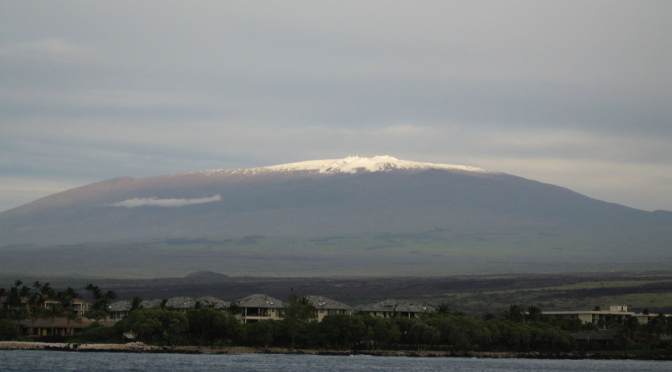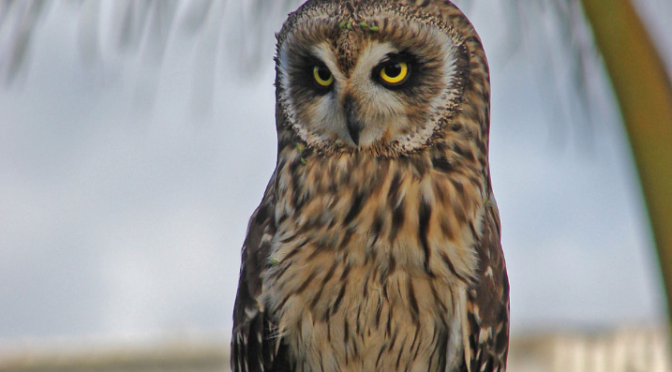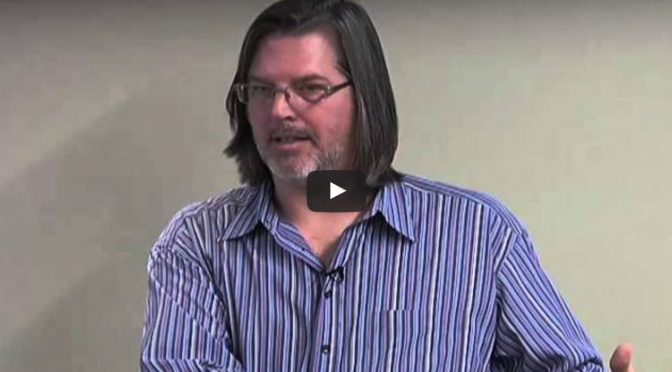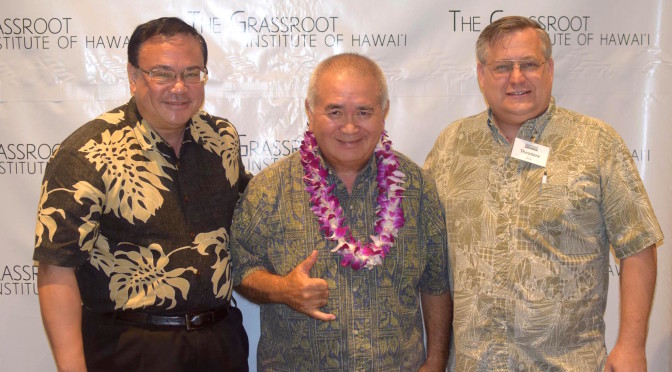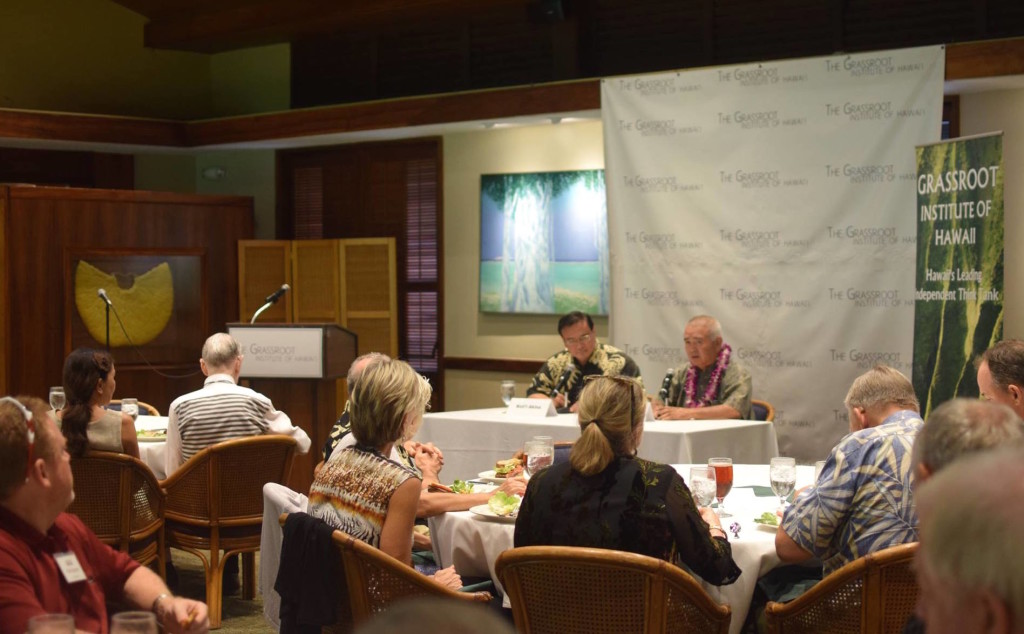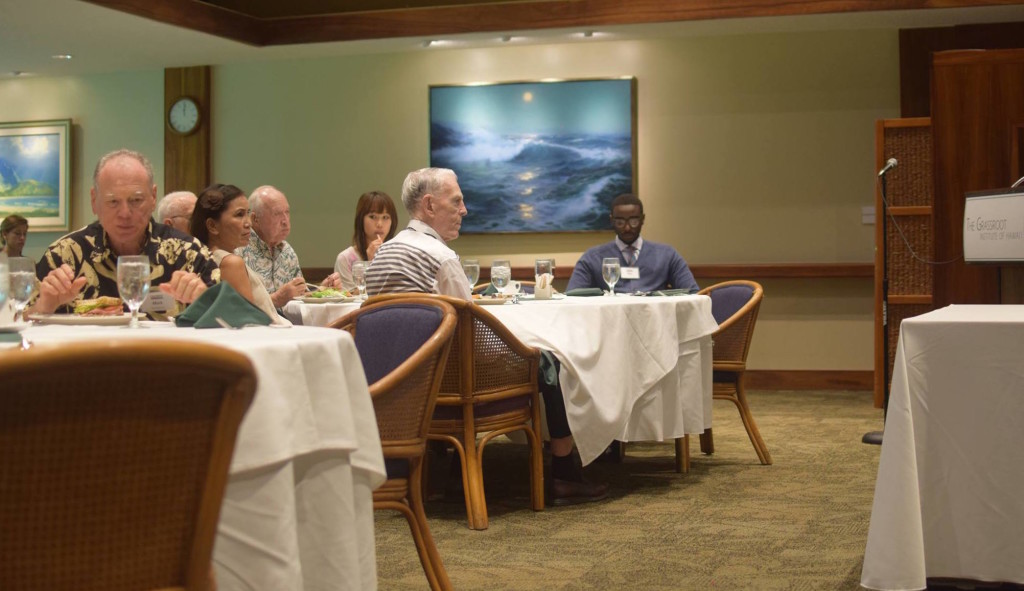Category Archives: Uncategorized
Introducing Richard Ha’s New YouTube Channel
Response to News of Lawsuit
You may have seen the article on the front page of the Hawaii Tribune-Herald stating my wife June and I are among those being sued by the contractor building our medical cannabis growing site in Pepe‘ekeo.
It was a bit of a shock to see that on the front page of the paper before we were even served with the lawsuit or knew the details.
In this case, there is a dispute regarding services rendered. It’s not about choosing not to, or not being able to, pay the bill.
We pay our bills.
My wife June and I are only named in the suit because we own the land under the project, which we lease to Lau Ola.
When I was a small kid, my pop told me, “No mistake kindness for weakness.”
Why am I telling you this? Because what’s right is right.
There is a Pipeline for Hawaiian Astronomers
Sunday’s Hawaii Tribune-Herald had an article about Hawaiian astronomers testifying in the Thirty Meter Telescope contested case hearing last week.
From the article Astronomers Make Their Case:
Native Hawaiian astronomer Paul Coleman says the Thirty Meter Telescope would not just help unlock the mysteries of the universe, but also provide him a link to his ancestors.
Coleman, along with fellow astronomer Heather Kaluna, were the last of TIO International Observatory’s witnesses called in its ongoing contested case hearing this past week.
I first met Heather Kaluna back in 2006 or 2007 when I was a Keaholoa STEM advisor at the University of Hawai‘i at Hilo. The Keaholoa STEM program aims to “increase enrollment, support, and graduation rates of Native Hawaiian students at UH-Hilo in science & mathematics disciplines, and increase familiarity and the use of related technology.”
When I spoke to the college students back then, I told them about starting the Adopt-a-Class program at Keaukaha Elementary School. That program raised money to send students on field trips to places like ‘Imiloa Astronomy Center that they wouldn’t otherwise be able to take.
Heather was in the Keaholoa program. After I spoke, she came up and asked me how she could donate money to help the kids at Keaukaha. She was a “starving college student” herself. I knew she should be spending her money on putting herself through school, not worrying about the kids at Keaukaha. It stuck with me.
She studied astronomy at UH-Hilo and then UH-Manoa. Now she’s a postdoctoral fellow at the Hawaii Institute of Geophysics and Paleontology. I saw her recently when she and I, along with Barry Taniguchi, ended up on the selection committee for the new Institute for Astronomy (IfA) director.
There is a pipeline of Hawaiians coming up in astronomy. Paul Coleman was the first native Hawaiian astronomer. Then came Heather, and behind her is Mailani Neal.
Students that want to be Hawaiian astronomers
I attended the 2015 Office of Hawaiian Affairs (OHA) hearing when OHA voted to rescind its support of the TMT. Mailani, then a high school student at Hawaii Preparatory Academy, told trustees, in tears, that she wanted to go into astronomy. Now she is on the mainland getting her degree and she will be an astronomer.
And I know of at least one more person who may be in the Hawaiian astronomer pipeline. On one of my last tours of the banana farm, there was a girl from Kamehameha Schools. It was a couple years ago and I think she may have been in eighth grade. She hung close to me and I thought maybe she wanted to go into farming.
But afterward she came up and told me, in a soft voice, that she wanted to be an astronomer.
I really regret that I didn’t follow up and connect her with Heather and Mailani. That I didn’t tell them, “Look, here’s another girl coming up the pipeline.” After the fact, I tried to find out who that young girl was but I wasn’t successful.
I’m so conscious of young people in elementary school, middle school, high school. They have aspirations you don’t know about, and they need help when they need help.
It’s like the story I just told here about my cousin Frank Kamahele. He was 11 years old when he knew he was going to be an airplane pilot. He didn’t know how, but he knew he would be. And he was.
It still bothers me that I didn’t connect that young girl with the others already on the path, and I’d still like to. That was maybe two years ago. If anyone knows who she is, please let me know.
Big Island Education: How to Help Our Children Soar
Are you interested in Big Island education and helping our children? This note from Perpetuating Unique Educational Opportunities, Inc (PUEO) shows you how to help:
Mahalo for all of your support. We had a great turnout at the Contested Case hearing in Hilo last Friday. However, you should know PUEO is more than just a participant in the Contested Case. We are a IRC 501(c)(3) non-profit actively engaged with our community in providing educational opportunities for our children. We already have started our programs and there are more in the works. For more information, check out our website www.alohapueo.org
If you click on Support Us, you will see that you can order tee-shirts and make a donation. If you received a tee shirt from us last week, you may want to consider making a small donation via paypal to cover the costs. The actual cost of our first run of shirts was $15. Of course if you would like to donate more, we would be 😁!
Please tell your friends about PUEO! Please volunteer. We could use support in programs for all of our children. Mahalo & Aloha!
PERPETUATING UNIQUE EDUCATIONAL OPPORTUNITIES, INC.
“Let our children soar!”
Connect with us
Stay tuned with our website: www.alohapueo.org
Like us on facebook: PUEO
Follow us on Twitter: @alohapueo #alohapueo
email us: infopueo@gmail.com
Only 2 Days to ‘A Bird’s Eye View of the Future’
Would you like to see ‘A Bird’s Eye View of the Future: Energy, Economy and Environment’?
Nate Hagens is speaking the day after tomorrow – Tuesday night at 6:30 p.m. – at UH Hilo in UCB 100.
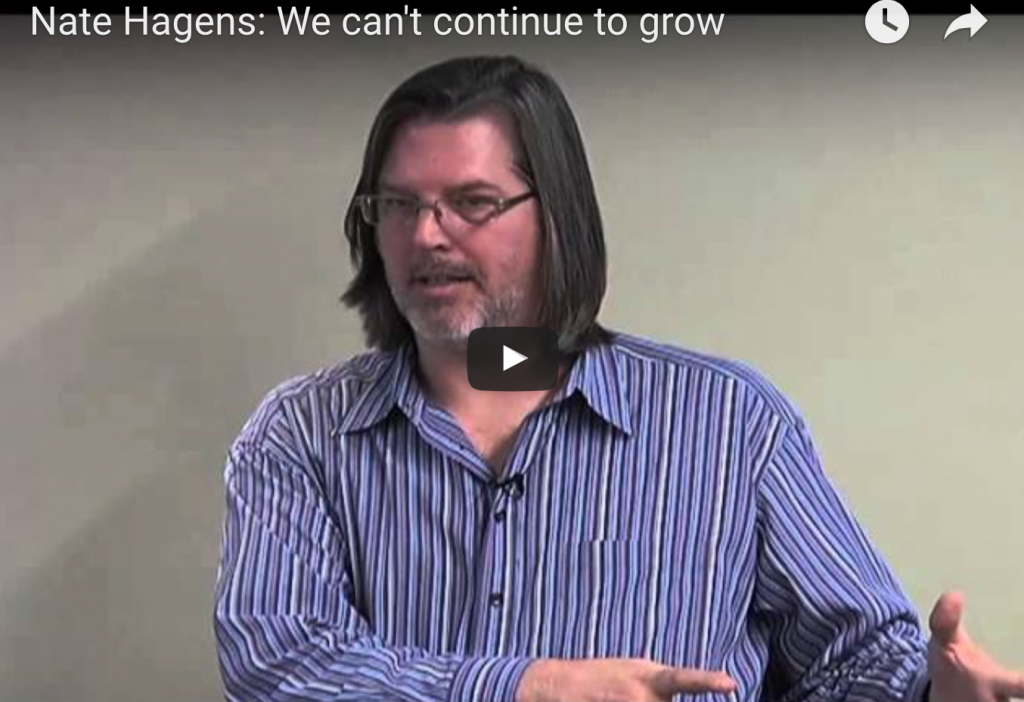 He will speak about our need to adapt for the changes happening around us. He feels strongly that it’s today’s young people who should be concerned, because it’s their time coming up, and he will discuss what we need to do to make their world a better place. Bring a young person or two with you if you can!
He will speak about our need to adapt for the changes happening around us. He feels strongly that it’s today’s young people who should be concerned, because it’s their time coming up, and he will discuss what we need to do to make their world a better place. Bring a young person or two with you if you can!
Click to hear a short preview of what Nate will discuss. This will be a very good talk and I highly recommend you attend. Mark your calendar!
What I Learned About My Employees
Yesterday, when I told my employees we have to shut down the farm, I said to let their supervisor know if they want to submit their name to work for the medical marijuana group that may lease some of our land (should they win a license).
This morning I learned that all of my workers are interested in working there.
We were already working on shutting down the farm when this medical marijuana group approached me, and I wasn’t sure how I felt about it at first.
But knowing now that my workers all want to work there is significant to me. One of the workers has worked for us for 38 years, and another for 23 years. This isn’t just about me, it’s about all of us, and we don’t leave our friends behind. It’s sort of like when I was in Vietnam and the unspoken rule was that we all came home or no one came home.
I had told the medical marijuana group I would only consider leasing to them if they agreed to consider my workers for jobs first.
There’s no guarantee , of course, that any of this will happen. They would have to be granted a license from the state to grow and distribute medical marijuana. The application process is currently underway.
Now that I know all my employees want to work there, I’m going to do whatever I can to help them win that license, because that means I’m helping my workers get jobs.
Hawaii News Now just came out and interviewed me about our closure. There’s both an article and video at the link:
After 4 decades, Hawaii Island banana farm shutting down
Posted: Jan 07, 2016 5:19 PM HST Updated: Jan 07, 2016 6:38 PM HST
By Mileka Lincoln
HILO, BIG ISLAND (HawaiiNewsNow)
After nearly 40 years in business, Maunakea Banana Company and Hamakua Springs Country Farms is shutting down. President and owner Richard Ha informed his employees Wednesday.
“Every single person said they would like to stay until the end — and that kind of floored me, because I was very much willing to adapt and do whatever they wanted to do, because it’s after all them that’s being affected most,” Ha said.
Ha’s decision is the second major agriculture closure in as many days. On Wednesday, Alexander and Baldwin announced it would end its sugar plantation operations on Maui.
Farmers say rising production costs are cutting into already minimal profit margins, making it tougher to stay in business. Ha says the biggest culprit is oil prices….
Nate Hagens on What’s Coming Re: Energy, Jan 12
I helped arrange for Nate Hagens, a well-known speaker on “big picture” issues facing human society, to speak at UH Hilo on Tuesday, January 12th. He’ll be at UCB 100 at 6:30 p.m. His talk will be about how we can cope. Here is a short preview of what he will discuss:
I want to share an article of mine that ran in the Huffington Post last April. It’s about the people I turn to regarding energy issues, and they remain the same.
Before I rerun it for you here, I’ll add that the fracking revolution, which no one saw coming, caused the oil price to plummet a year ago. But as Robert Rapier points out, we are very close to the bottom of the oil cycle, and we are likely going to repeat the cycle.
And here is that look back at the Huffington Post article (4/1/2014):
The People I Turn to Re: Energy Issues
It is clear to me that the most important issue we face here on the Big Island right now is that of energy costs. There is a huge risk associated with the rising price of oil, it’s going to affect us all, and we don’t have the luxury of time to deal with it. We need to figure it out now.
We have resources here and ways to address this. It’s not rocket science. It’s all a matter of cost and common sense. What I find is that the rubbah slippah folks get it quickly.
It comes down to a matter of attitude. Instead of being the people who look for a thousand ways why, “No can!” we must become people who look for the one reason why “CAN!!”
Energy issues are completely interconnected with agriculture — together, they all lead to our food security, or lack thereof — and I appreciate all the supportive testimony from so many people re: my renomination to the state Board of Agriculture. Here is a full list of the testimony, which includes support from some of the very knowledgeable people I turn to to learn about and confirm information about energy issues.
If it sounds like I know what I am talking about re: energy, it is because I have spent a lot of time at conferences and also learning from these experts, whose testimony you can read at that link above:
#7 Mayor Billy Kenoi. Mayor Kenoi recognized early on that geothermal would play a crucial role in our energy future and that’s why he helped the Geothermal Working Group, authorized by SCR 99, accomplish its work. I was part of a delegation he took to see geothermal operations at Ormoc City, Philippines. We visited a geothermal plant sited on the flanks of a volcano that last erupted 100,000 years ago. (In comparison, Mauna Kea last erupted 4,000 years ago and so is likely an even hotter spot for geothermal.) The mayor also formed a task force to evaluate the health effects of geothermal on the community.
#204 Henk Rogers. Henk is founder of the Blue Planet Foundation and understands and appreciates the potential of geothermal base power energy. He operates his own grid at Pu’uwa’awa’a Ranch. He also has a fully functional hydrogen refueling station on site. Hydrogen fuel cell cars are coming to the Big Island. Henk is a doer more than a talker. When he does talk, it’s likely to be with the King of Bhutan or Sir Richard Branson about energy issues.
#89 TJ Glauthier has operated at the highest level of our national government. He was second in command in the Department of Energy in the Clinton Administration. His list of accomplishments is so long that when I introduced him to the senior assets managers at Kamehameha Schools, I did it like this: TJ has an extremely long list of accomplishments but let me just describe him this way: He is a “good guy.” That’s all I needed to say. Here in Hawai’i, we all know what that means. He is a good friend and we are in constant contact.
#257 Robert Rapier. Like Mayor Kenoi, Robert Rapier is a “scrappah.” His was the lone voice that opposed Vinod Khosla’s biofuel projects because the net energy did not add up. Several hundred million dollars of subsidies later, Robert proved to be right. He knows his stuff. He has actually operated industrial-scale chemical plants, and yet he can explain scientific concepts in a way that is easy for the layman to understand. I can call him at all times of the day or on weekends. We have become good friends.
#82 Nate Hagens. Nate was editor of The Oil Drum blog, where academics, oil industry professionals and investors came to see what was new. If you participated, you had better know what you were talking about. These folks did not suffer fools lightly. The Oil Drum did not stop publishing because Peak Oil was dead; I think it stopped because we know all we need to know. Now it’s time to do something about it.
Charlie Hall. (See his testimony at this post.) Charlie Hall is a world-renowned systems ecologist. He does not speak about biology from an individual silo but talks about how it involves energy and its effects on real people. Environmentalists who are not systems-oriented sometimes forget about the effects on people. Charlie is known as the father of modern day Energy Return on Investment (EROI). I helped arrange lectures for him to speak at UH Hilo as well as UH Manoa. His wife Myrna, Charlie and myself have become good friends.
#84 Gail Tverberg. Gail is a former insurance actuary whose job was to price risk. She has a stark view of the future. Although I cannot find fault with her view of things, I am the eternal optimist and spend my time looking for workarounds. Gail wrote in support of our Big Island Community Coalition’s efforts to lower electricity rates. (As it turned out, we were successful in defeating the Aina Koa Pono biofuel project, which would have cut off options for lowering our electricity rates.) I helped bring Gail to Hilo for a presentation at the Hilo Hawaiian Hotel and spent a whole weekend taking her family around the Big Island. I asked her a million questions.
I wrote this in November, and it’s still true. From Let’s Adapt to Change and Survive: “Charles Darwin said it’s not the strongest nor the smartest who survive, but the ones that can adapt to change. Let’s survive, and more.”
Happy Holidays!
Remembering My Pop’s Values
The Grassroot Institute of Hawaii invited me to speak the other day. Grassroot Institute President Keli‘i Akina told me he’d been following my writing and thinks some of our values align.
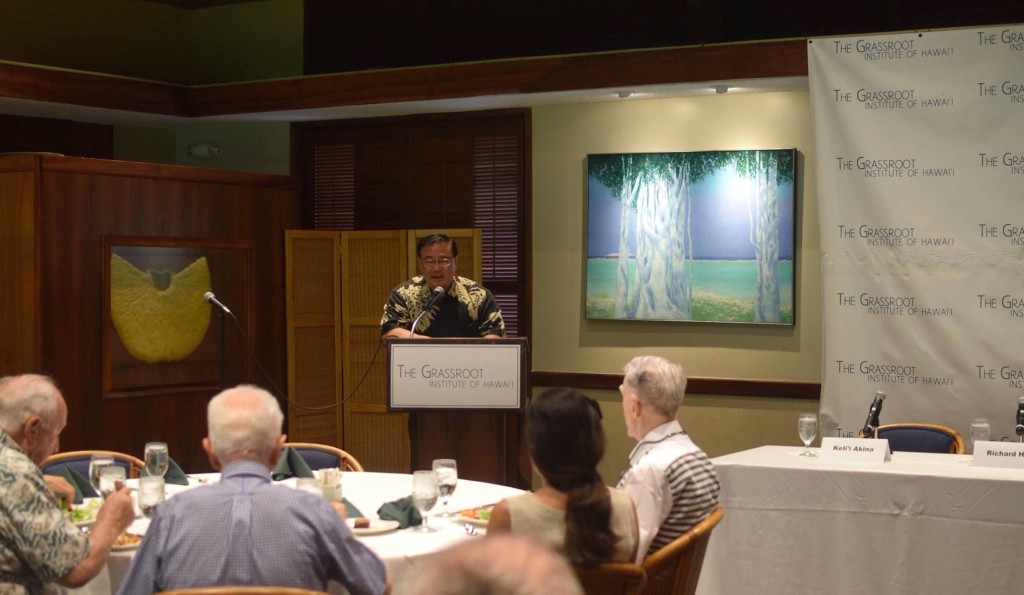
The format was that of a Q&A. Members asked me for my thoughts about the Thirty Meter Telescope and the protest, for instance. I think that not compromising is a difficult position to take, I told them, because then you’re not adaptable to the future.
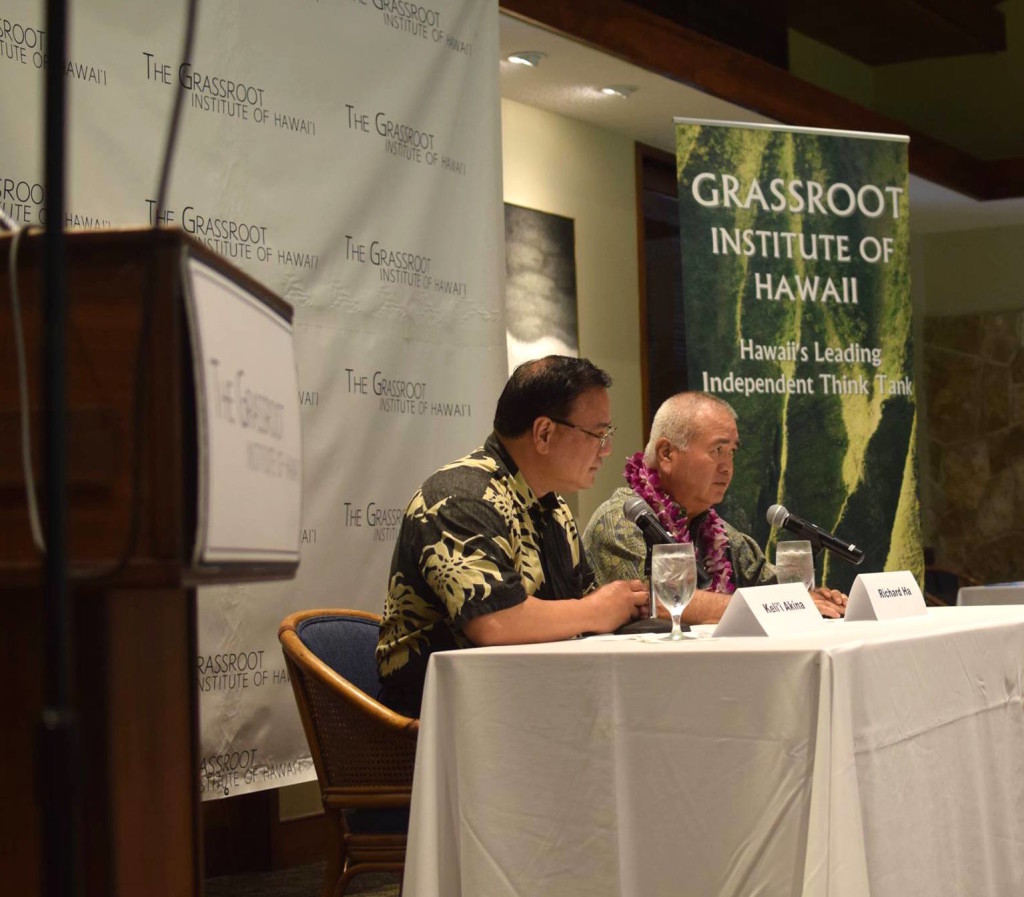
They asked me about GMOs, and I told them what I have said before: just because science can detect gold in seawater doesn’t mean you would invest in a gold mine in Hilo Bay. You’d lose money. The pluses have to exceed the minuses, or else you have to go do something else. There’s no free lunch. This is true for organisms, organizations and civilizations.
I told them I welcome change, and that my strategy is always to look 10 years to the future and plan for that. My thinking is that you have to make small changes along the way, so you don’t need to make catastrophic and often impossible changes at the last minute. That’s the difference in short-term vs. long-term thinking. This isn’t anything new; it’s what my Pop taught me when I was 10 years old. Though there were some years after that when I was smarter than my parents, I said, but then I got back to it.
I told them that by quoting my Pop, I don’t have to remember what I said yesterday, and everybody laughed.
- Not no can, can!
- Get thousand reason why no can. I just looking for the one reason why can.
- Find two solutions for every problem and one more just in case.
- Just because science can detect gold in seawater doesn’t mean you would invest in a gold mine in Hilo Bay. Lose money.
- The pluses have to exceed the minuses or you have to go do something else.
- There is no free lunch. That is true for organisms, organizations and civilizations.
- If you look outside your front porch and you see lots of rubbah slippahs, you are a rubbah slippah person.
- Plan for the future so you can make small adjustments as you go instead of one big painful decision when you no more time.
I’ve also added a couple more things:
- Two-thirds of the economy is made up of consumer spending. If the folks on the lowest rungs of the economic ladder had extra spending money, they would spend and everyone would benefit. I call that “trickle-up economics.”
- We all come back or no one comes back. That was the unwritten rule in Vietnam and it influenced me a lot in later years. It became that it’s about all of us, not just a few of us.
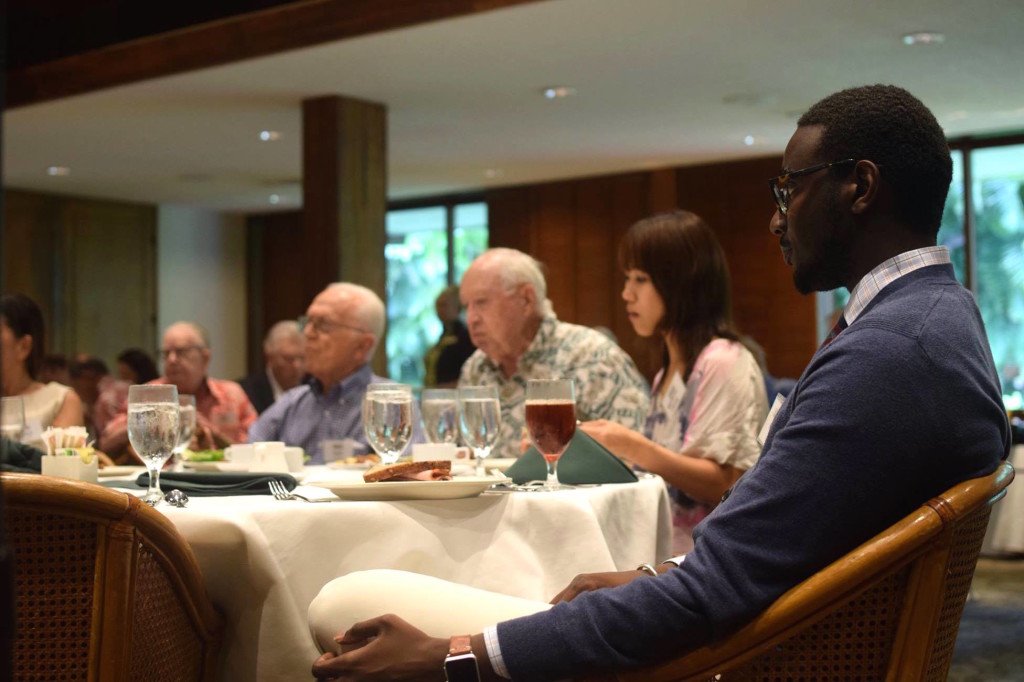
Somebody came up to be afterward and said, “Farmers are so grounded.” He said something I think is right on target – that it’s not about the details, because you can get technical people to work on the details. It’s about planning for the future.
My Pop only went to the sixth grade but he was very practical and he knew about survival. He taught me most of what I needed to survive in this world.

